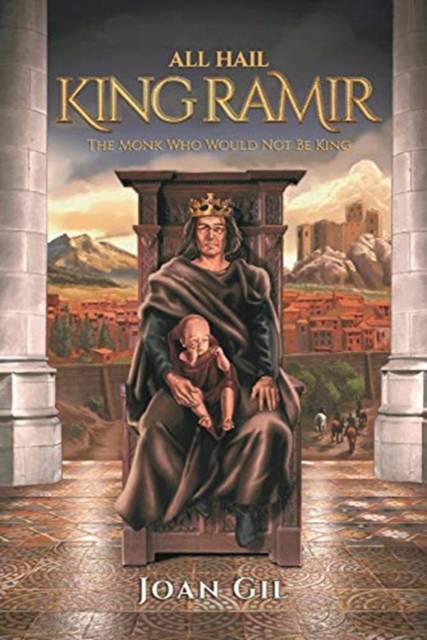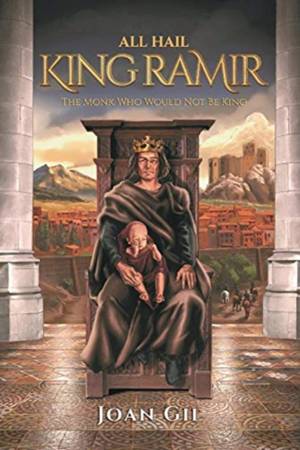
- Retrait gratuit dans votre magasin Club
- 7.000.000 titres dans notre catalogue
- Payer en toute sécurité
- Toujours un magasin près de chez vous
- Retrait gratuit dans votre magasin Club
- 7.000.0000 titres dans notre catalogue
- Payer en toute sécurité
- Toujours un magasin près de chez vous
All Hail King Ramir
The Bishop Who Refused to Be King and Fight Wars Volume 1
Joan Gil
Livre broché | Anglais
19,95 €
+ 39 points
Description
Alphonse the Battler, the greatest known warrior of his time and sovereign of all peninsular Christian kingdoms except Catalonia, orders his young and beloved brother Ramir to leave the monastery and join him in the siege of Saragossa. This wealthy moorish kingdom in the north of the peninsula has been taken over by the Almoravids, a fanatic jihadist muslim nation from North Africa and is threatening to cross the Pyrenees (as it had happened once before, a century earlier) and march toward Rome. Crusaders from all Europa are joining Alphonse. On the way Ramir understands and sees for the first time the cruelty and horror of war. He meets the Duke William of Aquitaine (his future father-in-law) known as the King of Troubadors, a licentious, conceited and dangerous man (and a singer-poet) and witnesses Alphonse's victory. Ramir is a humble lonely monk who cannot handle his high position. The king encourages him to travel to Aquitaine. The Duke might have a daughter for Ramir, who is recognized by everybody as Alphonse's heir apparent. Alphonse seems to encourage him to have children. In Poitiers, the capital of Aquitaine, the young man is seduced by the young Princess Agnes but Ramir runs away in horror when terrible scandals resulting from the public debauchery, alcoholism and recklessness of the Duke arise. Next he visits Burgos, main city of northern Castile, where his brother King Alphonse rules as husband of Queen Urraca. He expects to sire a heir to all his kingdoms, but Urraca has already a child from here first marriage. it becomes evident that he is known to be homosexual and that the Queen mocks and insults him. Alphonse hits and puts the Queen in prison. Again disappointed by the vanity, troubles and unchristian contradictions of the world, Ramir definitively chooses priesthood and life as a monk. Alphonse understands that he is not going to have a successor and Queen Urraca succeeds in dissolving their marriage and removing him from Castile. Alphonse was an invincible warrior but he finally falls into a trap and is mortally wounded by the Almoravids. In his last will, he leaves his kingdoms to God and the Virgin Mary. The kingdoms of Aragon and Navarre become very unsettled. Ramir clearly does not want the crown and he had never been trained for it. Many electors are reluctant to choose a Bishop as king. Finally the crown of Aragon is literally forced upon Ramir for lack of alternatives but Navarre, the land of the basques, severs her long union with Aragon. Ramir immediately faces a feudal uprising and is upset by the killings and feudal intrigues. He attempts to establish trade relations with the muslims but is not willing to continue his brother's war. Realizing that a heir is needed, he marries his old flame Agnes of Aquitaine, already a widow with sons, but Ramir writes that he does it not do it to satisfy "carnal desires" but only to sire a son. He is disappointed when Agnes brings to the world Peronella, a baby girl. Ramir and his advisors clearly recognize that the kingdom is breaking down in disarray and that something needs to be done. At this time, Ramir performs the diplomatic master stroke of the Iberian Middle Ages. He plights his one or two year old daughter Peronella to Count Ramon Berenguer of Barcelona, who rules Catalonia (the old Marca Hispanica of Emperor Charlemagne). He will abdicate immediately in Peronella's favor and the Count will take over with full irrevocable authority his entire kingdom. The Count, a young and dashing man with an excellent military record, rejects the royal crown born by his betrothed wife Peronella (whom she will marry in Lleida at the age of 14) and starts signing documents as "Count of the Barceloneans and Prince of the Aragonese). Aragon and Catalonia had been united under a single king but preserving separate Parliaments, laws and languages. Pleased with his solution, Ramir resumes life in his old monastery while Agnes returns to Aquitaine.
Les avis
Nous publions uniquement les avis qui respectent les conditions requises. Consultez nos conditions pour les avis.







